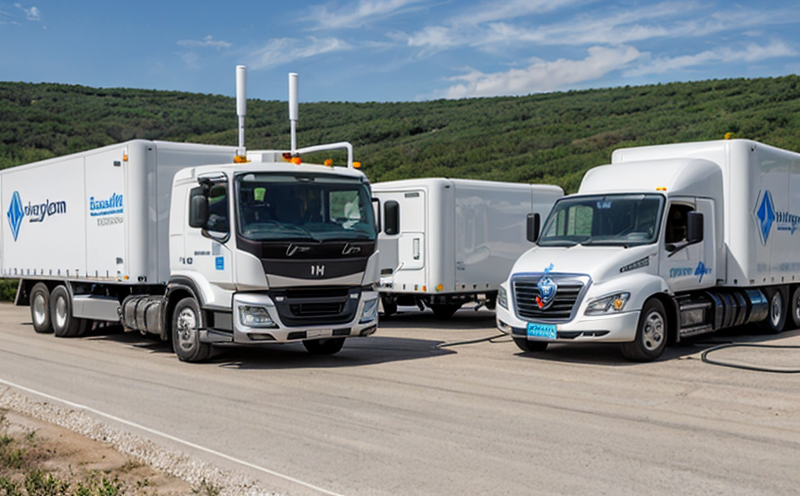IEC 62282-2 Fuel Cell Module Performance Testing
The IEC 62282-2 standard is a globally recognized framework for testing fuel cell modules, ensuring they meet the highest safety and performance standards. This service focuses on evaluating the efficiency, durability, and operational characteristics of hydrogen fuel cells using this internationally accepted protocol.
Fuel cells are critical components in the transition to cleaner energy solutions. They convert chemical energy into electrical power through an electrochemical process that does not produce harmful emissions like traditional combustion engines. However, for these systems to be reliable and efficient, they must undergo rigorous testing to ensure consistent performance and safety across different environments.
Incorporating the IEC 62282-2 standard into our testing protocols allows us to provide clients with comprehensive insights into their fuel cell modules' capabilities. This includes not only basic operational parameters but also more advanced metrics such as power output, voltage stability, and thermal management. Our state-of-the-art facilities enable precise simulations of real-world conditions under which these components will operate.
The process typically involves several key steps:
- Initial configuration and setup to replicate operating environments
- Application of specified input gases (hydrogen and oxygen)
- Data collection during steady-state operation at various load levels
- Analysis of generated electrical power outputs against expected values per the IEC standard
- Evaluation of thermal management systems’ effectiveness through monitoring temperatures throughout the module
- Assessment of durability by exposing units to repeated cycles of startup, load variations, and shutdown sequences
This thorough approach ensures that any discrepancies or issues are identified early in the development lifecycle. Our team works closely with clients to ensure all tests align with their specific requirements while adhering strictly to international standards.
By partnering with us for IEC 62282-2 testing, organizations can gain confidence that their fuel cell modules are not only meeting current regulatory expectations but also prepared to meet future demands. This service supports innovation in renewable energy technologies by providing robust validation data essential for certification and market entry.
In summary, our commitment to excellence in IEC 62282-2 testing ensures reliable performance metrics that contribute significantly towards advancing sustainable energy solutions globally.
Applied Standards
The IEC 62282-2 standard is designed to provide a comprehensive approach for testing fuel cell modules, ensuring they meet stringent performance and safety criteria. This internationally recognized framework covers multiple aspects including electrical characteristics, thermal management systems, durability, and other critical parameters.
The standard specifies detailed protocols for conducting tests on individual fuel cells within larger stacks or modules, which is essential given the complexity of these devices. It outlines methodologies for measuring various attributes such as open-circuit voltage, short-circuit current, internal resistance, and more under controlled conditions.
- Battery Management Systems (BMS): Ensures safe operation by regulating battery charging, discharging, and maintenance.
- Safety Requirements: Includes measures to prevent overheating, overpressure, or other potential hazards during testing.
- Environmental Conditions: Tests performance across a range of temperatures and humidity levels typical in real-world applications.
The IEC 62282-2 standard is widely adopted by manufacturers worldwide due to its stringent requirements. Compliance with these standards demonstrates adherence to best practices in the industry, fostering trust among stakeholders including customers, regulators, and investors.
Our laboratory adheres strictly to these guidelines during every phase of testing, ensuring accurate results that reflect true performance capabilities of fuel cell modules under realistic operating conditions.
Benefits
- Enhanced Product Reliability: Testing according to IEC 62282-2 ensures that your fuel cell modules are robust and dependable, capable of withstanding harsh environments without compromising performance.
- Increased Market Acceptance: Compliance with this globally recognized standard enhances the credibility of your products among buyers who value quality and safety standards.
- Avoidance of Regulatory Issues: By meeting these stringent requirements, you can avoid costly delays associated with non-compliance during certification processes.
- Improved Efficiency: Our tests help identify areas where improvements can be made to optimize energy conversion rates and reduce losses.
- Increased Safety: Rigorous evaluation ensures that all safety features are functioning correctly, reducing risks associated with malfunctioning components.
- Enhanced Durability: Through durability testing, we ensure your fuel cells can withstand repeated cycles of start-up, load variation, and shutdown without degradation in performance.
The benefits extend beyond just meeting regulatory requirements; they also contribute to the continuous improvement of technology. Our rigorous testing procedures help manufacturers refine their designs, ultimately leading to better-performing products that meet both current and future needs more effectively.
International Acceptance and Recognition
The IEC 62282-2 standard enjoys widespread acceptance across countries that prioritize sustainable energy solutions. Its recognition is particularly significant in regions where there are ambitious targets for reducing carbon footprints through increased use of renewable energies.
- Europe: Many European Union member states mandate compliance with IEC standards, recognizing them as a benchmark for excellence in safety and performance.
- Australia: The Australian Renewable Energy Agency (ARENA) has expressed support for international standards like IEC 62282-2 to ensure consistency and reliability of hydrogen fuel cells.
- North America: Both the U.S. Department of Energy and Canada have incorporated IEC guidelines into their respective frameworks, emphasizing their importance in advancing clean energy technologies.
The consistent adoption of this standard across various sectors highlights its relevance not only within specific industries but also internationally. By aligning with these standards, manufacturers can tap into broader markets while ensuring that their products meet the highest international benchmarks for quality and reliability.
Our laboratory ensures full compliance with all relevant sections of IEC 62282-2, guaranteeing accurate results and peace of mind regarding product performance. Whether you're looking to enter new markets or enhance existing ones, adhering to these standards is crucial for success.





